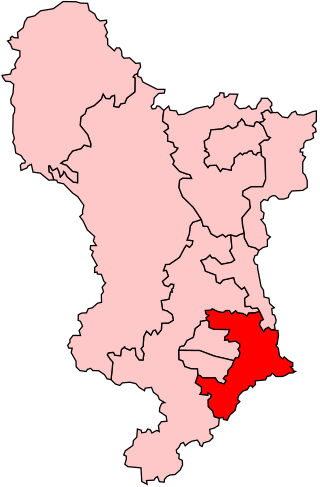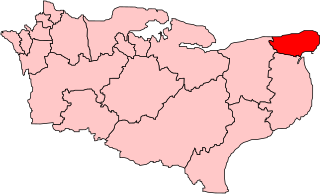Related Research Articles

Croydon South was a constituency represented in the House of Commons of the Parliament of the United Kingdom. It elected one Member of Parliament (MP) by the first past the post system.
South Buckinghamshire was a parliamentary constituency in the county of Buckinghamshire, England. From 1950 to 1974, it returned one Member of Parliament (MP) to the House of Commons of the Parliament of the United Kingdom, elected by the first-past-the-post voting system.
East Grinstead was a parliamentary constituency in the Kingdom of England, the Kingdom of Great Britain, and the United Kingdom. It first existed as a Parliamentary borough from 1307, returning two Members of Parliament to the House of Commons elected by the bloc vote system. The borough was disfranchised under the Reform Act 1832, but the name was revived at the 1885 election when the Redistribution of Seats Act created a new single-member county division of the same name.

South East Derbyshire was a parliamentary constituency in Derbyshire. It returned one Member of Parliament to the House of Commons of the Parliament of the United Kingdom, elected by the first past the post voting system.

Runcorn was a parliamentary constituency centred on the town of Runcorn in Cheshire. It returned one Member of Parliament (MP) to the House of Commons of the Parliament of the United Kingdom, elected by the first past the post system.
Esher was a borough constituency represented in the House of Commons of the Parliament of the United Kingdom. It elected one Member of Parliament (MP) by the first past the post system of election. In the general elections during its 47-year lifetime it was won by three Conservatives successively. In area it shrank in 1974, then regrew in 1983 taking in four sparsely inhabited wards which proved to be temporary, as omitted from the successor seat, Esher and Walton.

Oswestry was a United Kingdom Parliamentary constituency. It was a constituency of the House of Commons of the Parliament of the United Kingdom from 1885 to 1983, when it was renamed North Shropshire. It elected one Member of Parliament (MP) by the first past the post method of election.

Isle of Thanet was a county constituency which returned one Member of Parliament (MP) to the House of Commons of the Parliament of the United Kingdom from 1885, until it was abolished for the February 1974 general election.

Enfield West was a constituency which returned one Member of Parliament (MP) to the House of Commons of the Parliament of the United Kingdom. It was created for the 1950 general election and abolished for the February 1974 general election.
Enfield East was a constituency which returned one Member of Parliament (MP) to the House of Commons of the Parliament of the United Kingdom. It was created for the 1950 general election and abolished for the February 1974 general election.

Salford West was a parliamentary constituency in the City of Salford in Greater Manchester from 1885 until 1983. It returned one Member of Parliament (MP) to the House of Commons of the Parliament of the United Kingdom.

Nelson and Colne was a constituency in Lancashire which returned one Member of Parliament (MP) to the House of Commons of the Parliament of the United Kingdom from 1918 until it was abolished for the 1983 general election.

Tonbridge is a parliamentary constituency in Kent, centred on the town of Tonbridge. It returned one Member of Parliament (MP) to the House of Commons of the Parliament of the United Kingdom.
Leicester South East was a borough constituency in the city of Leicester. It returned one Member of Parliament (MP) to the House of Commons of the Parliament of the United Kingdom.
Rowley Regis and Tipton was a parliamentary constituency centred on the towns of Rowley Regis and Tipton in Staffordshire. The Rowley Regis section of the constituency was in Worcestershire from 1966 until 1974, as was the Tividale area (originally in the borough of Dudley before those dates.
Coventry North was a parliamentary constituency in the city of Coventry in the West Midlands. It returned one Member of Parliament (MP) to the House of Commons of the Parliament of the United Kingdom, elected by the first past the post system.
Lewisham South was a parliamentary constituency in Lewisham, London which returned one Member of Parliament (MP) to the House of Commons of the Parliament of the United Kingdom from 1950 until it was abolished for the February 1974 general election.

East Ham South was a parliamentary constituency centred on the East Ham district of London, which was in Essex until 1965. It returned one Member of Parliament (MP) to the House of Commons of the Parliament of the United Kingdom, elected by the first past the post voting system.
Wembley North was a parliamentary constituency in what was then the Borough of Wembley in North-West London. It returned one Member of Parliament (MP) to the House of Commons of the Parliament of the United Kingdom, elected by the first-past-the-post voting system.
Wembley South was a constituency in what was then the Borough of Wembley in Middlesex and from 1965 wholly in northwest London. It returned one member (MP) to the House of Commons of the UK Parliament, elected by the first past the post system, returning Conservative apart from in 1945, the victory of the First Attlee ministry when it returned a Labour member.
References
- ↑ British parliamentary election results, 1950-1973 by FWS Craig
- ↑ British parliamentary election results, 1950-1973 by FWS Craig
- ↑ British parliamentary election results, 1950-1973 by FWS Craig
- ↑ F W S Craig, British Parliamentary Election Results 1950-1973; Political Reference Publications, Glasgow 1973
- ↑ F W S Craig, British Parliamentary Election Results 1950-1973; Political Reference Publications, Glasgow 1973
- ↑ British parliamentary election results, 1950-1973 by FWS Craig